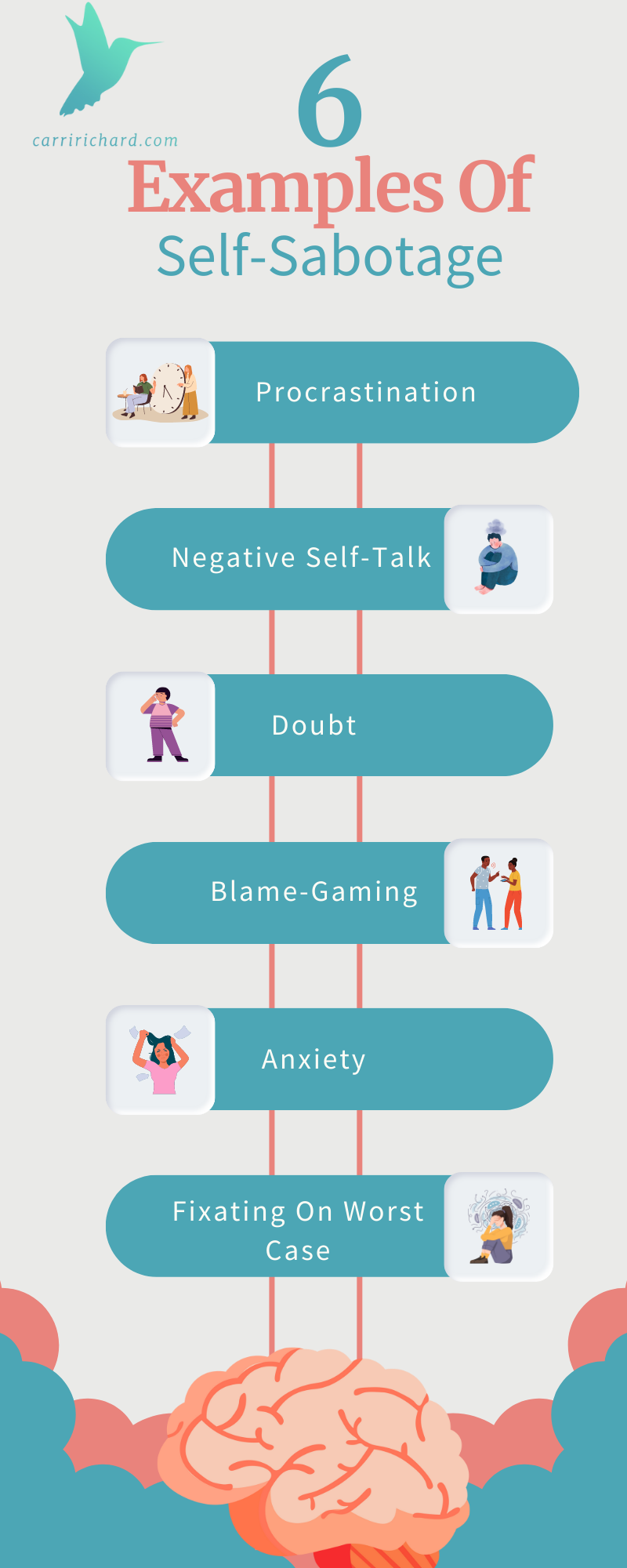Self-sabotage – it’s the silent “saboteur” that lurks inside all of us….often slowing us down, and preventing us from reaching our goals. We’ve all been there at some point….eagerly pursuing our dreams, and full of determination…..only to somehow find ourselves taking one step forward, and two steps back. It’s frustrating, it’s discouraging, and it can lead you to believe that there’s something fundamentally wrong with you. But the truth is, self-sabotage is a common experience. And in order to transform your relationship with it, you’ve got to become AWARE of the patterns that are holding you back, and empower yourself with the right tools to move forward. The result? You’ll pave the way for deeper personal growth, improved well-being, and a more fulfilling life journey!
Examples of Self-Sabotage
Self-sabotage is a relentless force that can undermine your progress, and prevent you from realizing your true potential. At times, you might find yourself enthusiastically pursuing your dreams, filled with excitement….only to encounter a seemingly invisible barrier that holds you back.
Here are the most common ways self-sabotage can show up, on your journey:
- Procrastination
Procrastination is a classic self-sabotaging behavior that many of us grapple with. When you believe you have “too much on your plate” or you “don’t have enough time,” it becomes tempting to avoid important tasks and goals. You might tell yourself: “I’ll do it later,” but later never seems to arrive. As a result, opportunities slip away, and your progress stagnates, leaving you feeling frustrated and unaccomplished.
- Negative self-talk and self-doubt
Our internal dialogue can be our biggest ally….or our most ruthless enemy. When self-doubt takes over, and negative self-talk becomes the norm, you erode your self-confidence and diminish your potential for success. Thoughts like “I’m not good enough,” or “I can’t do this,” chip away at your self-esteem and make you hesitant to take bold steps towards your aspirations.
- Blaming external circumstances for setbacks
Blaming external circumstances for setbacks is another form of self-sabotage that can hinder our progress. When faced with challenges, it becomes easy to point fingers at external factors, seeing them as the cause of your stagnation. By doing so, you relinquish control and absolve yourself of responsibility….ultimately preventing you from learning and growing from the experience.
- Anxiety and Fixating on the “Worst Case Scenario”
In critical moments….when decisions need to be made, or actions need to be taken, self-sabotage can manifest as anxiety and “worse case scenario” thinking. The fear of making the wrong choice or “failing” can paralyze you, leaving you stuck and unable to move forward. This anxiety can sabotage your progress and prevent you from seizing opportunities that could lead to growth and success.

“Self-sabotage is a detour, not your destination. You hold the power to reroute towards success.”
– Carri Richard
Why do I Self-Sabotage?

Self-sabotage doesn’t happen without reason – and if you look closely enough, you’ll likely notice repeating patterns in your life. These patterns typically point to the root cause of your self-defeating behavior. And they often stem from childhood experiences that have shaped your self-concept, beliefs, habits, and behaviors.
You see…during this formative period of your life, our brains are highly impressionable, and many of the interactions we have with caregivers, friends, family members and teachers, leave a lasting imprint on our subconscious minds. These early experiences shape our beliefs, self-perception, and overall view of the world, influencing how we navigate future challenges and opportunities. As we grow, these subconscious imprints can continue to impact our thoughts, behaviors, and decision-making processes, including our tendencies towards self-sabotage.
For example, let’s say you grew up in an environment where failure was met with harsh criticism and judgment. In response to this kind of upbringing, you developed a fear of making mistakes or taking risks….because you associate them with feelings of shame and inadequacy. This same fear might lead you to avoid challenging opportunities in the future, leading to a perpetual cycle of self-sabotage.
Another example might be if you were consistently compared to others, during your childhood….leading you to believe that you were never good enough. This could result in negative self-talk and a persistent sense of self-doubt, which ultimately, holds you back from pursuing your goals with confidence and conviction.
Sound (painfully) familiar? Understanding the origins of these patterns is a powerful step towards breaking free from self-sabotage! And by recognizing the influence of our childhood years, we can begin to challenge and reshape these beliefs.
The Brain’s Resistance to Change While Stopping Self-Sabotage

The human brain is an INCREDIBLE organ, constantly seeking to keep us safe and secure. Very naturally, it aims to establish routines, patterns, and familiar behaviors in order to protect us from potential threats (so smart!). And while this survival mechanism served us VERY WELL during primitive times…it can actually hinder our goals for personal growth and change, in this modern day and age.
When faced with new challenges or opportunities, much of our brain’s decision-making occurs at the subconscious level (95% in fact!), driven by deeply ingrained beliefs and past experiences. Our subconscious mind responds based on prior imprints….which can actually lead to self-sabotaging behavior, if we experienced failure or pain in the past. In fact, our own subconscious mind will silently steer us away from taking risks or embracing new opportunities. Because, well…..safety and security.
One of the BIGGEST fears we have, as humans? Social rejection. Which means…the desire to “fit in” and be accepted by others can lead to self-sabotaging behavior, if we feel our sense of connection and acceptance is at risk. As a result, we often choose to “play it safe” and stay within our comfort zone…at the peril of pursuing our dreams.
The good news? You’re not fundamentally flawed if you engage in self-sabotage. Your brain’s resistance to change is a natural part of being human….and now that you’re AWARE of this handy-dandy protective mechanism, you can develop greater agency over your behaviors and choices.
The Power of Community in Overcoming Self-Sabotage
If one of our biggest fears, as humans, is “social rejection”…..one of the BEST things we can do, to overcome self-sabotage, is immerse ourselves in a supportive community. Not only will this provide you with accountability, and the ability to navigate challenges with ease….it will give your subconscious mind the “proof” it needs, to feel safe and secure….even if you step outside your “comfort zone.”
All too often, we attempt to make a change in our lives…completely on our own. And although it’s not impossible to do so…it certainly requires an incredibly significant amount of will-power to override our own protective subconscious impulses. With the support and encouragement of a like-minded community, it becomes much easier to break the cycle of self-sabotage and take intentional action towards your goals.
Looking for the “right” community? I’m launching a brand new Mastermind on September 1st! This Mastermind will provide a space for individuals to come together, share their experiences, and support each other on their personal growth journey. In this community, you’ll find the encouragement and inspiration to overcome self-sabotage and unlock your full potential – right alongside a tribe of like-minded individuals who are ready to cheer you on, and celebrate your progress.

Don’t miss out on this transformative opportunity! Join the Mastermind and take the first step towards creating a more fulfilling and empowered life. Together, we’ll navigate the path to personal growth, break free from self-limiting beliefs, and embrace positive change. Your journey to self-discovery and success begins here.
How To Stop Self-Sabotage And Reach Your Full Potential
Self-sabotage is a common experience that can hinder our progress and prevent us from realizing our true potential. It often emerges in the form of procrastination, negative self-talk, blame, and anxiety….ultimately holding us back from pursuing our dreams with confidence
The solution? By shedding light on these self-sabotaging thoughts and behaviors, we EMPOWER ourselves to challenge and overcome them….and set ourselves on a path towards sustained success!
And remember, you are not alone! – with the power of community, you can overcome self-sabotage and achieve the life you desire.
Much love,

